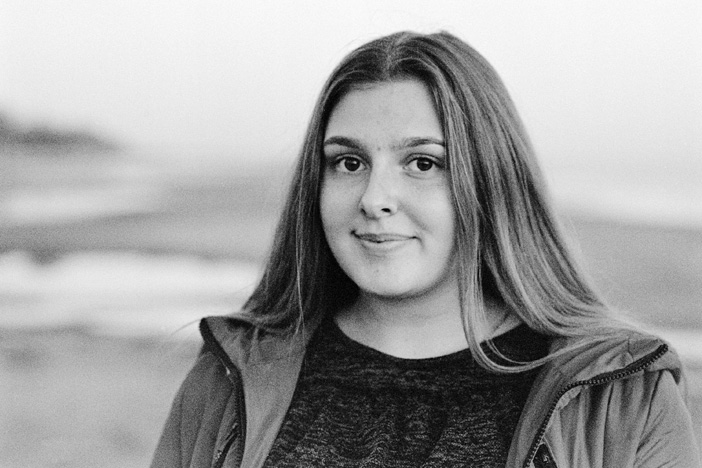
Katja, 16 years old, lives in Mariupol
»My class teacher told me about Yellow Bus and that they are organizing a summer camp for young people who are interested in film and journalism. In this summer camp, I got to know the profession journalism.<< >>
It is not as easy as you would imagine. Journalism is a very intense and dangerous profession. But nevertheless I would like to become a journalist. I like the emotions, the movement and the shocks that one experiences with this job.
I get most of my information from the Internet - like many other people. I go to our cultural center and there I talk about the things that I have read or seen. I hardly watch TV because I don't have time for it. I spend my time at school and then I have workshops.
There have also been false reports about Mariupol. I read for example that all was fine and there was no shooting, but then I call my aunt in Horliwka and she tells me that the situation there was very bad. She says that every day something happens there and then I wonder how I can trust the news. When I'm talking to my aunt, I could hear the tanks driving around.
When the war started here in 2014, I felt the war with my own body and I wrote about it. We drove into the city and there was shelling. Our father put us all in the car and we raced within five minutes through half of Mariupol. The drive was very bumpy because of the detonations and during the ride we were shocked by the vibrations. If our father hadn't got us out of there so quickly we would be dead today.
We moved to the city Staraya Yalta the next day, three hours drive from Mariupol. We stayed there for a month and then we came back to Mariupol and stayed here again. Now we have been living in Mariupol for five years.
As an outsider, you may be able to understand the war, but my mother worked as a nurse, and what she and her colleagues have seen and experienced is hard to understand. Although other people said that bombing and shooting took place, they were not personally affected because they lived far away. We don't have a house anymore and we just left with our swimwear and a small bag. As long as a person has not gone through war himself, it's difficult to understand what war really means.
I also have friends in the occupied territories. We talk and tell each other how we are, what happens there and if there is any news. I ask them and they tell me everything.
We also spoke about the war in our cultural center and that was very tough for me. It took me a year to talk about the war. Now, it's been three years and everything seems fine again, but sometimes during class, I have to cry because it's so hard to talk about the war.
Now, I would like to deal with something positive, maybe with fashion or design. I have also become calmer in the recent years and I rather accept things. I used to be more emotional, but now I'm a calmer human being because of the war.
When I visited Horliwka, there also were problems at the checkpoints. We were on the road for eight to nine hours and during the week it could happen that we had to wait for three to four hours at the checkpoints. Sometimes it happened that we could not pass because too many cars were waiting in front of us.«